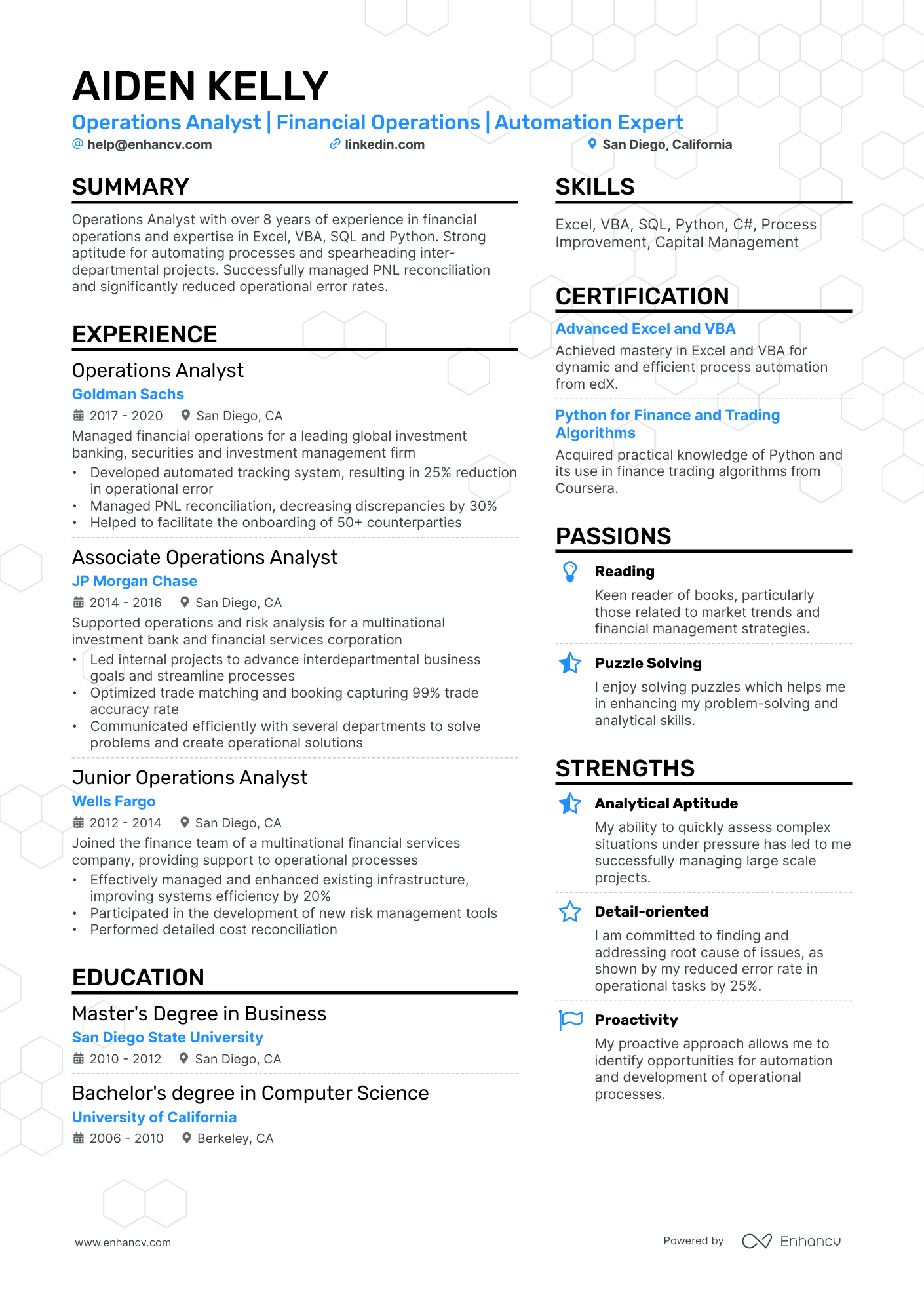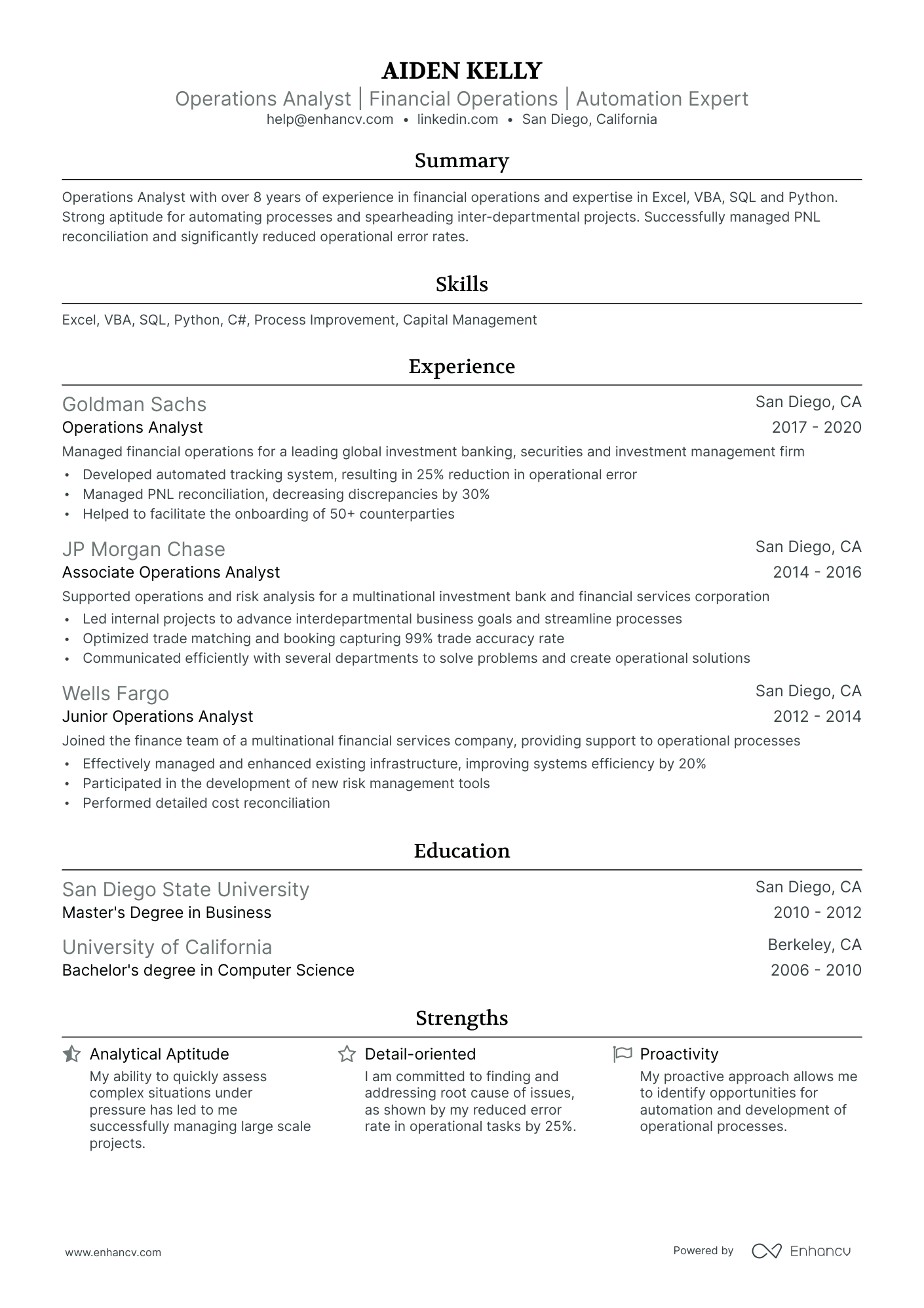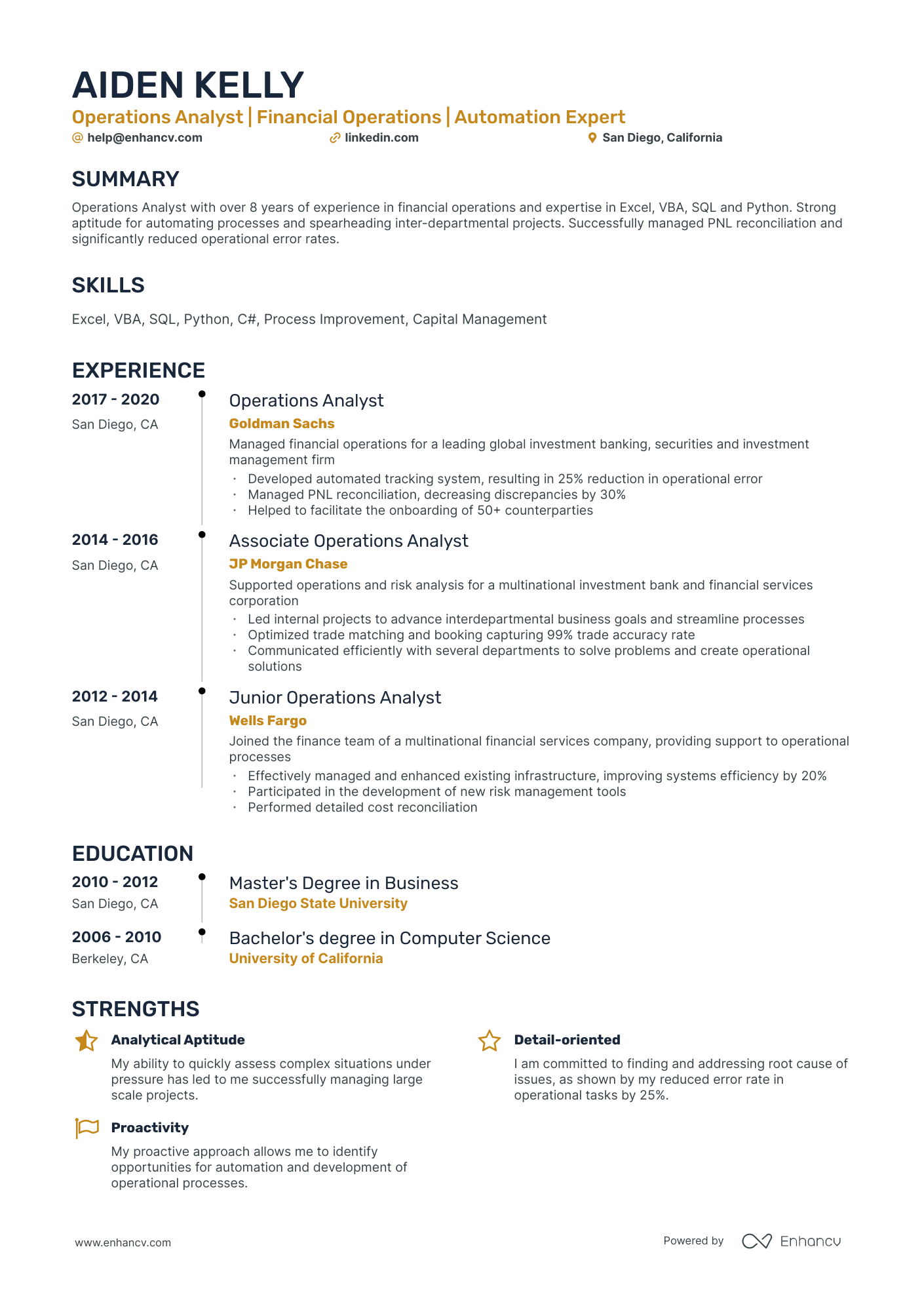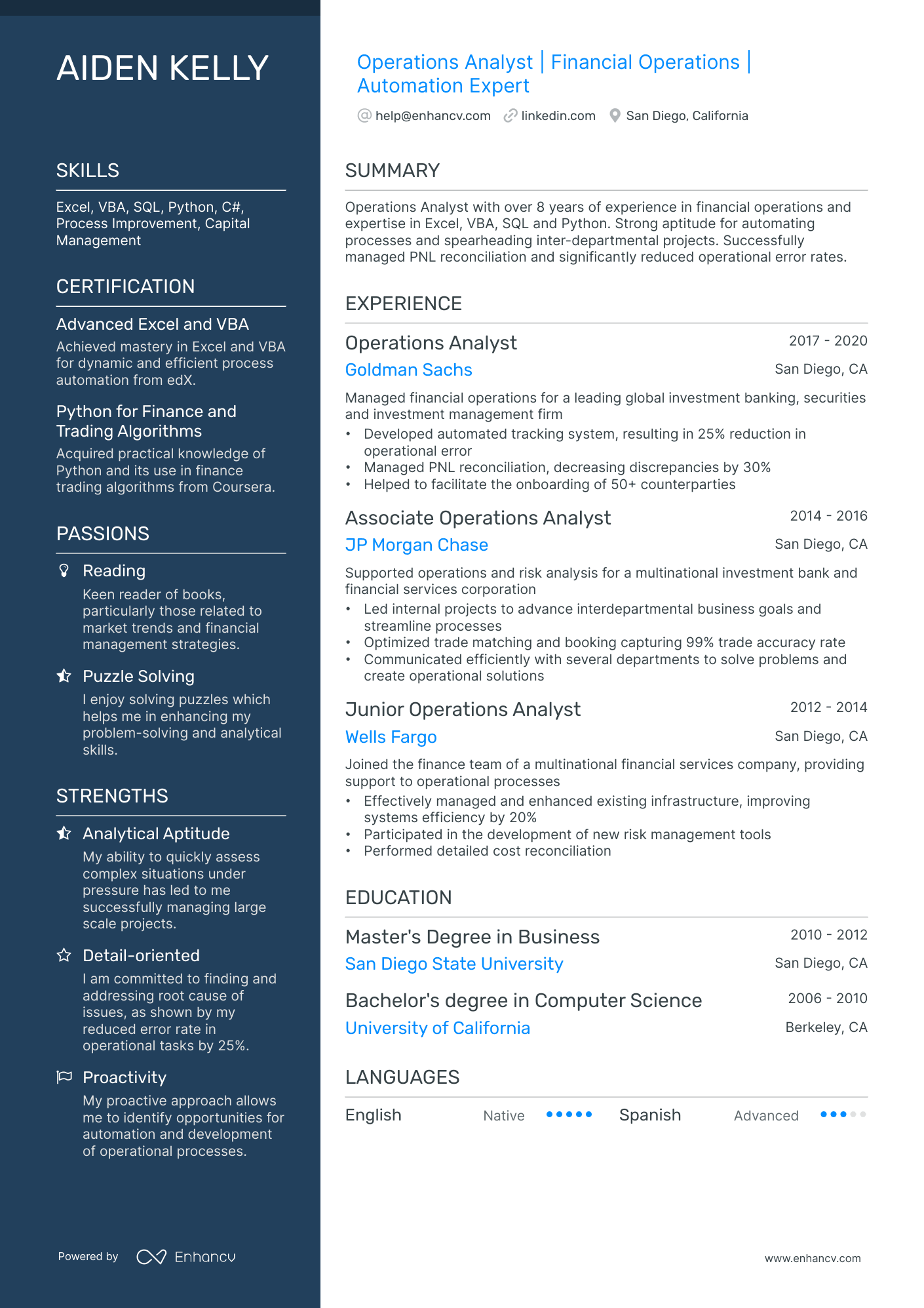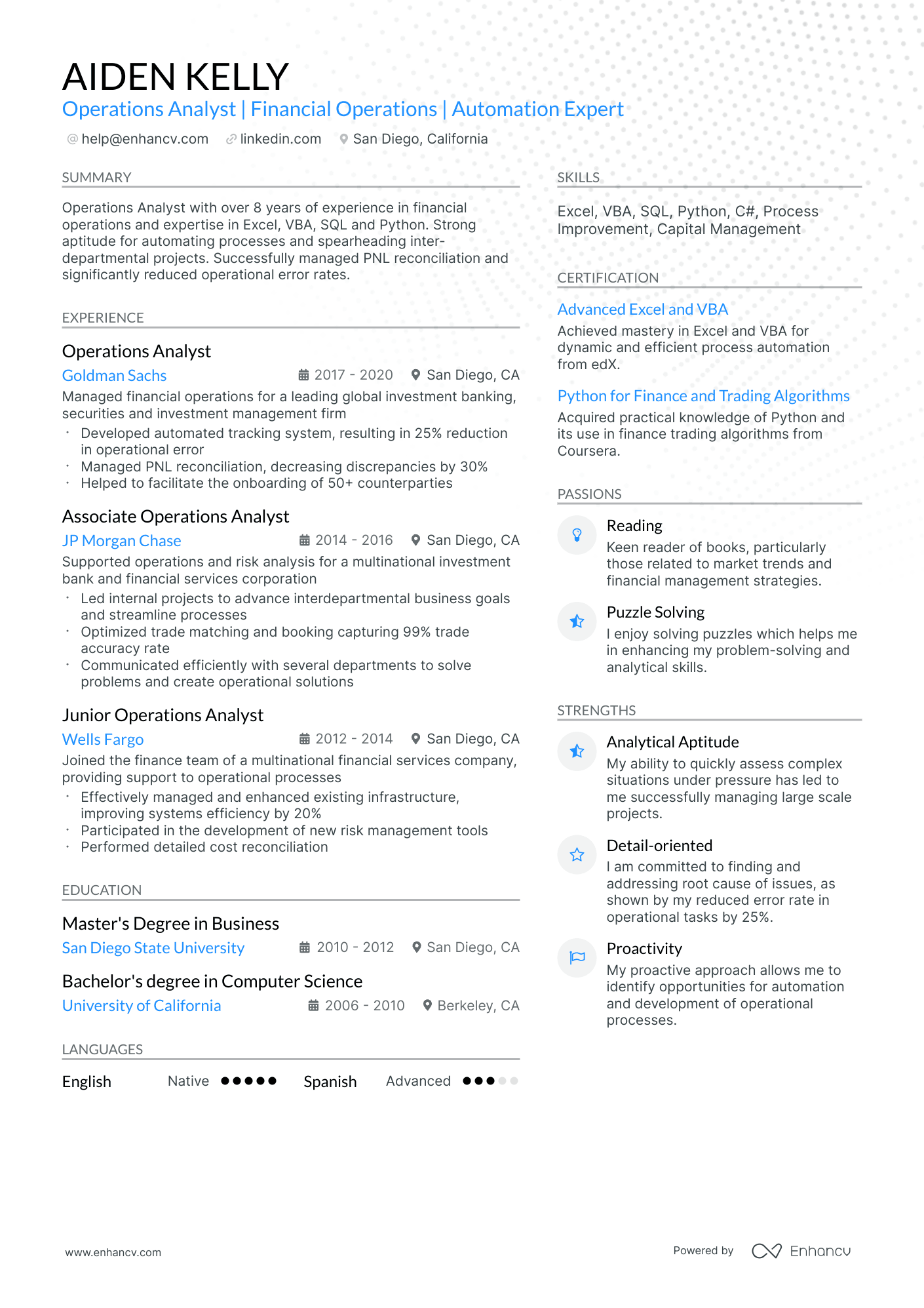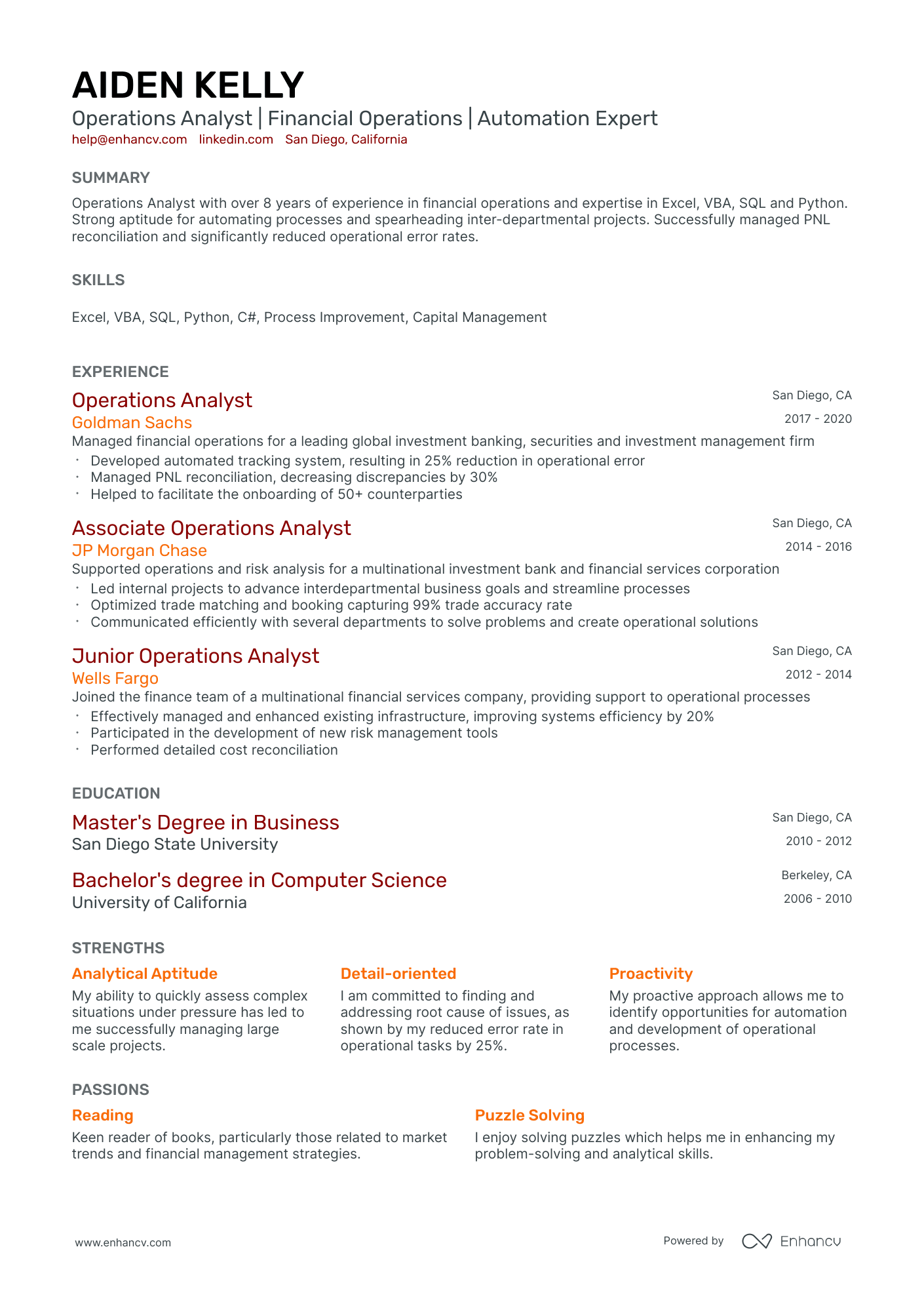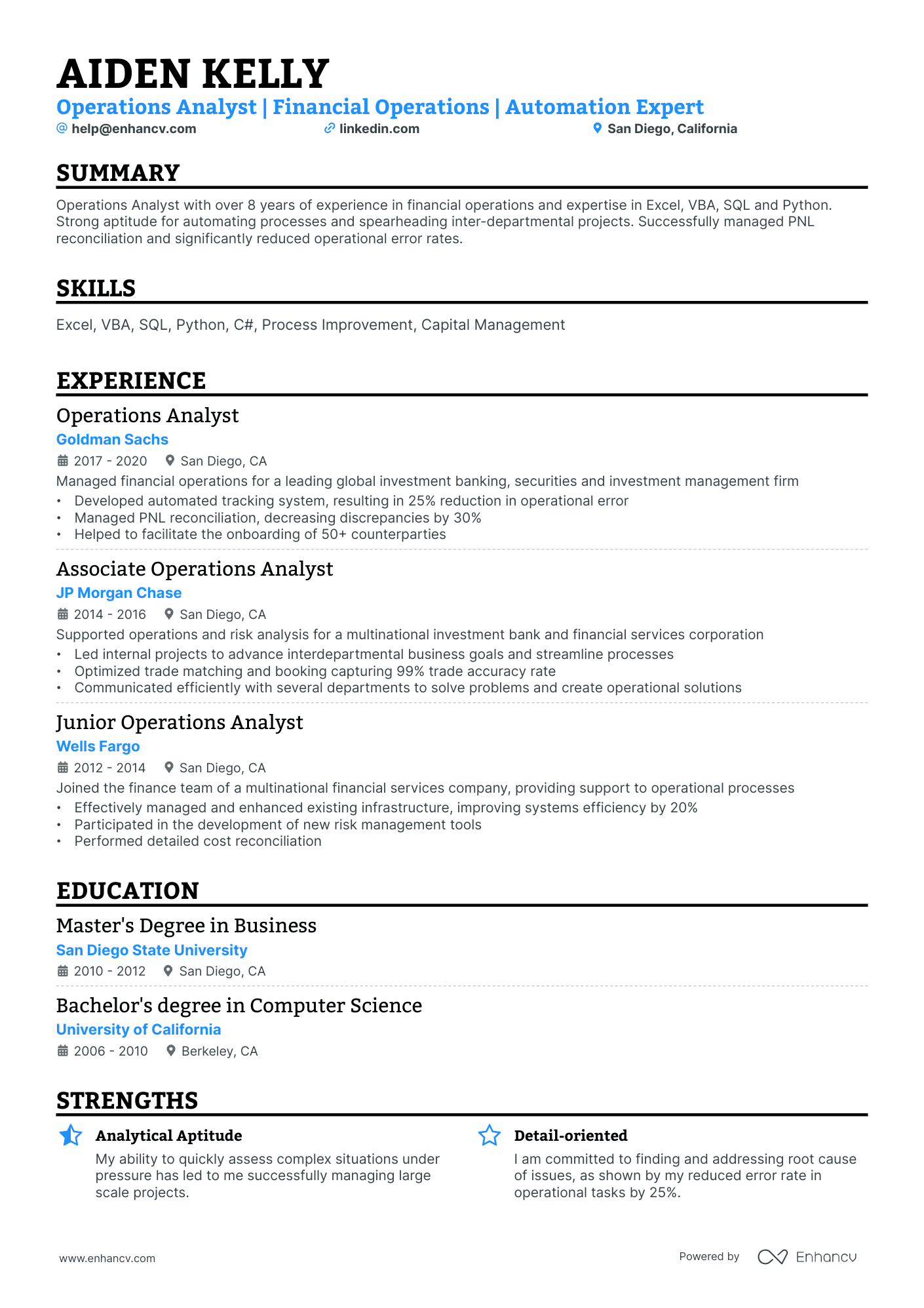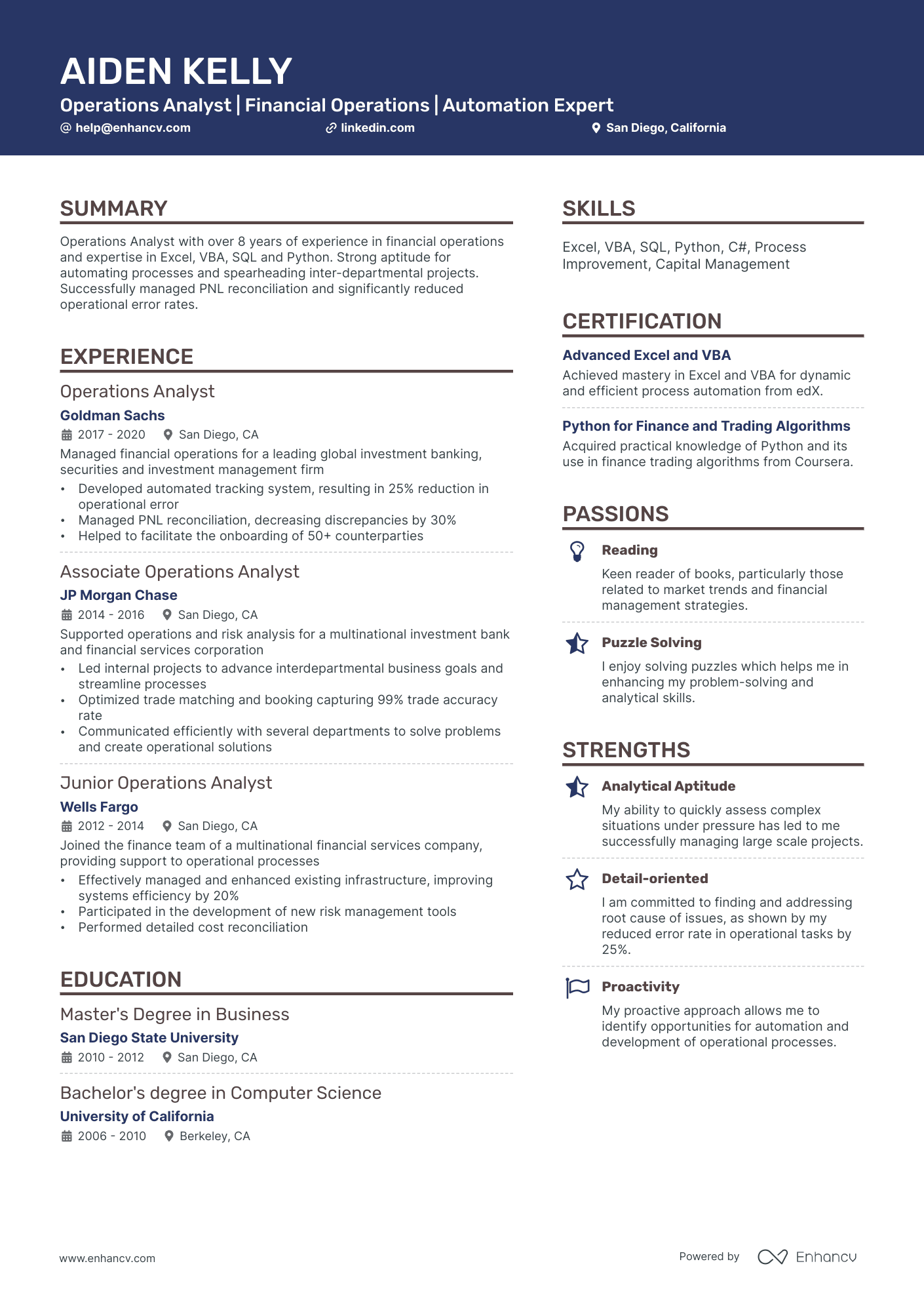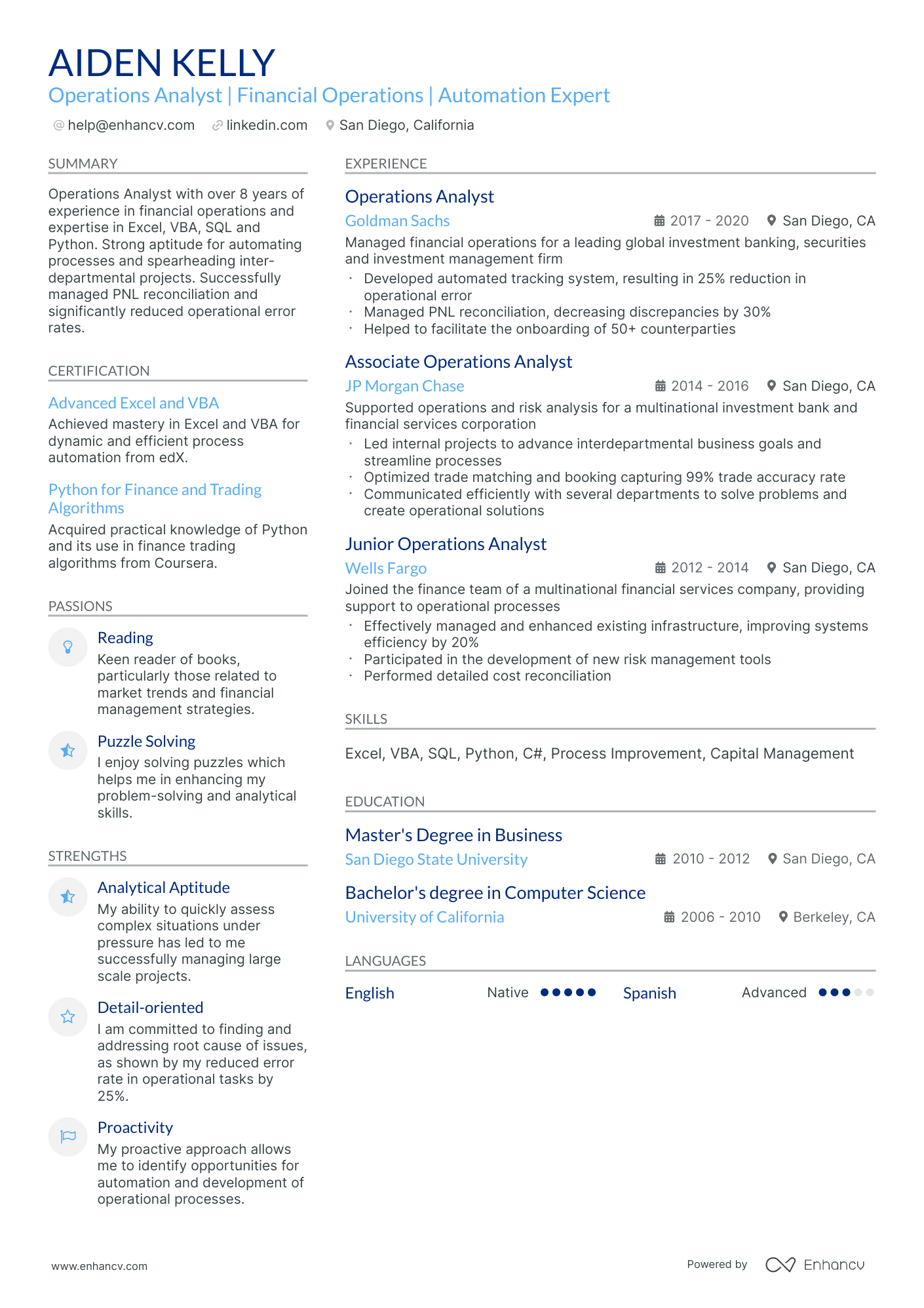One specific challenge faced by operations analysts when crafting their resumes is effectively showcasing their analytical skills and experience in improving operational efficiency, given the broad and often complex nature of their work. Our guide can assist in addressing this challenge by providing clear examples and a structured format to help you present your accomplishments and skill set in a concise, yet comprehensive manner, making it easier for potential employers to understand and appreciate your capabilities.
Dive into our operations analyst resume guide to:
- Explore top-tier resume examples, offering insights into the industry's best practices.
- Enhance sections like experience, education, and achievements with expert advice.
- Articulate your technical prowess and personal attributes, setting you apart from other candidates.
- Sharpen your focus on the distinct skills that make your operations analyst resume resonate with recruiters.
Recommended reads:
crafting a stellar operations analyst resume format
Navigating the maze of resume formatting can be challenging. But understanding what recruiters prioritize can make the process smoother.
Wondering about the optimal format, the importance of certain sections, or how to detail your experience? Here's a blueprint for a polished resume:
- Adopt the reverse-chronological resume format. By spotlighting your latest roles upfront, you offer recruiters a snapshot of your career trajectory and recent accomplishments.
- Your header isn't just a formality. Beyond basic contact information, consider adding a link to your portfolio and a headline that encapsulates a significant achievement or your current role.
- Distill your content to the most pertinent details, ideally fitting within a two-page limit. Every line should reinforce your candidacy for the operations analyst role.
- To preserve your resume's layout across different devices and platforms, save it as a PDF.
Targeting Canada? – Keep in mind their resume layout may differ from others.
Upload your resume
Drop your resume here or choose a file. PDF & DOCX only. Max 2MB file size.
Pro tip
Keep your operations analyst resume clear and concise. Top professionals narrate their career stories while highlighting their strengths.
Must-have sections on a operations analyst resume:
- A header to list your job title and contact information
- A resume summary or objective which highlights your top career achievements
- A detailed experience section where you emphasize the breadth of your expertise
- A skills box to put the spotlight on your social talents and technical strengths
- An education and certifications section which features your qualifications
What recruiters want to see on your resume:
- Experience in Operations Analysis: This refers to past experience or roles that have required operations analysis skills such as project management, workflow design, and process improvement.
- Quantitative Skills: Ability to work with large data sets, use statistical analysis tools, and make data-driven business decisions are highly valued.
- Problem-Solving Abilities: operations analysts should have excellent problem-solving skills, including the ability to identify issues and develop efficient solutions.
- Technical Proficiency: Familiarity with operations software (e.g., ERP systems) and data analysis tools (like Excel, SQL, or Python) is crucial.
- Communication Skills: The role often requires conveying complex information in an understandable way to various stakeholders, thus strong written and verbal communication skills are essential.
Recommended reads:
guide to your most impressive operations analyst resume experience section
When it comes to your resume experience, stick to these simple, yet effective five steps:
- Show how your experience is relevant by including your responsibility, skill used, and outcome/-s;
- Use individual bullets to answer how your experience aligns with the job requirements;
- Think of a way to demonstrate the tangible results of your success with stats, numbers, and/or percentages ;
- Always tailor the experience section to the operations analyst role you're applying for - this may sometimes include taking out irrelevant experience items;
- Highlight your best (and most relevant) achievements towards the top of each experience bullet.
You're not alone if you're struggling with curating your experience section. That's why we've prepared some professional, real-life operations analyst resume samples to show how to best write your experience section (and more).
- Conducted data analysis and generated reports to optimize operational efficiency resulting in a 15% reduction in production costs.
- Implemented process improvements, streamlining supply chain operations and reducing lead time by 20%.
- Collaborated with cross-functional teams to develop and implement inventory management strategies, reducing stock-outs by 25%.
- Utilized statistical modeling to forecast demand and optimize inventory levels, resulting in a 10% decrease in excess inventory.
- Led a team of analysts in identifying and resolving operational bottlenecks, increasing overall productivity by 12%.
- Analyzed customer feedback data to identify trends and recommended improvements, resulting in a 30% increase in customer satisfaction.
- Designed and implemented key performance indicators (KPIs) to monitor and measure operational performance, leading to a 25% improvement in efficiency.
- Developed and maintained operational dashboards for real-time monitoring of critical metrics, facilitating proactive decision-making.
- Assisted in the implementation of a new CRM system, training staff and optimizing workflows resulting in a 20% reduction in response time.
- Conducted cost-benefit analyses on proposed process changes, enabling informed decision-making and cost savings of $100,000 annually.
- Performed data mining and trend analysis to identify opportunities for cost reduction, resulting in annual savings of $500,000.
- Collaborated with operations teams to develop and implement lean manufacturing processes, increasing production capacity by 30%.
- Conducted time and motion studies to optimize resource allocation, reducing labor costs by 15%.
- Assisted in the implementation of an ERP system, leading end-user training sessions and ensuring seamless transition resulting in improved process efficiency.
- Developed and maintained operational documentation, standard operating procedures (SOPs), and work instructions, improving process consistency.
- Analyzed market data and identified growth opportunities resulting in a successful expansion into new regions, generating $1 million in revenue.
- Developed and implemented demand forecasting models utilizing advanced statistical techniques, improving accuracy by 20%.
- Collaborated with sales and marketing teams to develop pricing strategies based on market analysis, resulting in a 10% increase in profit margins.
- Managed vendor relationships and negotiated contracts, achieving cost savings of $200,000 annually.
- Led cross-functional teams in project management and execution of process improvement initiatives, reducing cycle time by 25%.
- Implemented machine learning algorithms to automate data analysis processes, reducing processing time by 50%.
- Developed and maintained SQL-based databases for operational data storage, enabling efficient data retrieval and analysis.
- Conducted root cause analysis of operational issues and developed corrective action plans, resulting in a 20% reduction in customer complaints.
- Collaborated with IT teams to implement cybersecurity measures and ensure data integrity and protection.
- Provided training and guidance to junior analysts, improving team productivity and knowledge sharing.
- Developed and implemented quality management systems, resulting in an overall defect rate reduction of 30%.
- Conducted process audits and identified areas for improvement, leading to a 25% increase in process compliance.
- Collaborated with cross-functional teams to design and implement performance measurement frameworks, enabling data-driven decision-making.
- Led continuous improvement projects utilizing Lean Six Sigma methodologies, resulting in $300,000 annual cost savings.
- Developed and delivered training programs on operational best practices, enhancing employee skills and knowledge.
- Analyzed supply chain data and identified opportunities for inventory optimization, reducing holding costs by 15%.
- Implemented demand planning tools and processes, resulting in a 20% improvement in forecast accuracy.
- Collaborated with logistics providers to streamline transportation operations, reducing lead time by 10%.
- Developed and monitored key performance indicators (KPIs) to track operational performance and drive continuous improvement.
- Led cross-functional teams in the implementation of a new warehouse management system, increasing order fulfillment efficiency by 25%.
- Conducted comprehensive data analysis to identify cost-saving opportunities resulting in annual savings of $1.2 million.
- Developed and implemented inventory optimization strategies, reducing stock-outs by 30%.
- Collaborated with finance teams to perform financial feasibility analyses for proposed operational initiatives.
- Led cross-functional teams in process improvement projects, resulting in a 15% increase in productivity.
- Provided recommendations for operational risk mitigation and ensured compliance with regulatory requirements.
- Utilized advanced data analytics techniques to identify patterns and trends, enabling proactive operational decision-making.
- Implemented robotic process automation (RPA) solutions, reducing manual effort and improving accuracy by 20%.
- Collaborated with cross-functional teams to develop and implement business intelligence dashboards, providing real-time visibility into operational performance.
- Analyzed customer behavior data and developed segmentation strategies, resulting in a 10% increase in targeted marketing effectiveness.
- Led process reengineering initiatives to streamline operations, reducing cycle time by 30%.
- Conducted time series analysis and predictive modeling to optimize workforce planning, resulting in a 15% reduction in employee turnover.
- Developed and maintained data visualization dashboards for operational reporting and performance tracking.
- Collaborated with HR teams to develop and implement talent management strategies, improving employee engagement by 20%.
- Led cross-functional teams in the implementation of a new HRIS system, streamlining HR processes and increasing data accuracy.
- Performed cost analyses on employee benefit programs, resulting in $100,000 annual cost savings.
The following content includes information from "O*NET OnLine" by the U.S. Department of Labor, Employment and Training Administration (USDOL/ETA). Used under the CC BY 4.0 license. The data represents the top responsibilities present on the task lists for operations analyst professionals.
Top Responsibilities for Operations Analyst:
- Gather and organize information on problems or procedures.
- Confer with personnel concerned to ensure successful functioning of newly implemented systems or procedures.
- Analyze data gathered and develop solutions or alternative methods of proceeding.
- Document findings of study and prepare recommendations for implementation of new systems, procedures, or organizational changes.
- Plan study of work problems and procedures, such as organizational change, communications, information flow, integrated production methods, inventory control, or cost analysis.
- Interview personnel and conduct on-site observation to ascertain unit functions, work performed, and methods, equipment, and personnel used.
- Prepare manuals and train workers in use of new forms, reports, procedures or equipment, according to organizational policy.
- Review forms and reports and confer with management and users about format, distribution, and purpose, identifying problems and improvements.
- Develop and implement records management program for filing, protection, and retrieval of records, and assure compliance with program.
- Design, evaluate, recommend, and approve changes of forms and reports.
Quantifying impact on your resume
<ul>
No experience, no problem: writing your operations analyst resume
You're set on the operations analyst role of your dreams. Yet, you have little to no work experience . Here's how you can curate your resume to substitute your lack of experience:
- Don't list every single role you've had so far, but focus on the ones that align with the job you're applying for
- Include any valid experience in the field - whether it's a university research project, or a summer internship
- Highlight the soft skills you're bringing along - those that will have an added value to your application.
- Focus on your education and certifications, especially if they make sense for the role.
Recommended reads:
Pro tip
Boost your resume by focusing on the practical aspects of each job requirement. While it's good to have job-related keywords on your resume, ensure they're backed by action verbs and quantifiable data. This gives recruiters a clear picture of your operations analyst professional journey.
Highlighting your hard and soft skills on your operations analyst resume
The skills section of your operations analyst resume should showcase your capabilities that align with job requirements.
Your hard skills, or technical skills, demonstrate your proficiency with technological innovations and specific software. On the other hand, your soft skills illustrate how you'd excel in the workplace environment with personal attributes like resilience, negotiation, and organization.
For a well-rounded operations analyst resume, it's essential to include both. Here's how to craft a standout skills section:
- Prioritize skills listed at the top of the job advert.
- Highlight unique skills you've honed over time.
- Choose soft skills that resonate with the company or department culture.
- Address essential job requirements by listing key skills for the operations analyst role that haven't been mentioned elsewhere in your resume.
Check out our sample skill list for operations analyst to get ideas on the most sought-after hard and soft skills in the industry.
Top skills for your operations analyst resume:
SQL
Excel
Tableau
Power BI
Python
R
Data Analysis
Process Mapping
Project Management Software (e.g., JIRA, Asana)
Business Intelligence Tools
Analytical Thinking
Problem Solving
Communication
Attention to Detail
Time Management
Team Collaboration
Adaptability
Critical Thinking
Decision Making
Interpersonal Skills
Next, you will find information on the top technologies for operations analyst professonals from "O*NET OnLine" by the U.S. Department of Labor, Employment and Training Administration (USDOL/ETA). Used under the CC BY 4.0 license.
Top technologies for Operations Analyst’s resume:
- Google Angular
- Spring Framework
- Blackboard software
- Transact-SQL
- Apache Kafka
- Apache Maven
Pro tip
Sometimes, basic skills mentioned in the job ad can be important. Include them in your resume, but don't give them too much space.
The importance of your certifications and education on your operations analyst resume
Pay attention to the resume education section . It can offer clues about your skills and experiences that align with the job.
- List only tertiary education details, including the institution and dates.
- Mention your expected graduation date if you're currently studying.
- Exclude degrees unrelated to the job or field.
- Describe your education if it allows you to highlight your achievements further.
Your professional qualifications: certificates and education play a crucial role in your operations analyst application.
They showcase your dedication to gaining the best expertise and know-how in the field.
Include any diplomas and certificates that are:
- Listed within the job requirements or could make your application stand out
- Niche to your industry and require plenty of effort to obtain
- Helping you prepare for professional growth with forward-facing know-how
- Relevant to the operations analyst job - make sure to include the name of the certificate, institution you've obtained it at, and dates
Both your certificates and education section need to add further value to your application.
That's why we've dedicated this next list just for you - check out some of the most popular operations analyst certificates to include on your resume:
Best certifications to list on your resume
- Certified Supply Chain Professional (CSCP) - APICS
- Certified Business Analysis Professional (CBAP) - IIBA
- Certified Information Systems Security Professional (CISSP) - (ISC)²
- Professional in Business Analysis (PBA) - GAQM
- Tableau Desktop Certified Professional - Tableau
- AWS Certified Big Data - Specialty - AWS
Pro tip
If you have plenty of certifications, prioritize the most relevant and industry-recognized ones. Arrange them based on their relevance to the job at hand.
Recommended reads:
Summary or objective: maximizing the impact of the top third of your resume
The top third of your operations analyst resume is crucial. It's often the first thing recruiters see and can set the tone for the rest of your application.
Whether you choose a resume summary or a resume objective, make it count. The former is great for showcasing career highlights, while the latter balances your achievements with your future aspirations.
Both should be tailored to the role, as there's no universal approach to crafting the perfect operations analyst summary or objective. Use the examples below as a starting point.
Resume summary and objective examples for a operations analyst resume
Four additional sections to consider for your operations analyst resume
To give a fuller picture of who you are, consider adding these sections to your operations analyst resume:
- Awards - to showcase your achievements.
- Interests - to share passions outside of work.
- Publications - to highlight your contributions to the field.
- Projects - to spotlight significant accomplishments, even those outside of traditional work settings.
Key takeaways
- Your resume's layout should be both visually appealing and content-rich.
- Emphasize achievements that resonate with the job's requirements.
- Detail your skills, both technical and interpersonal, with real-world examples.
- Ensure the top section of your resume provides a clear snapshot of who you are and what you offer.
- When detailing experience, focus on tasks, actions, and their outcomes.
